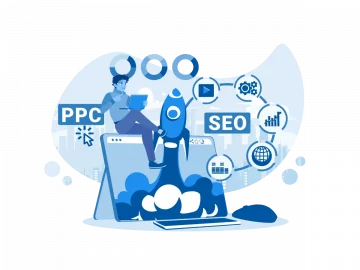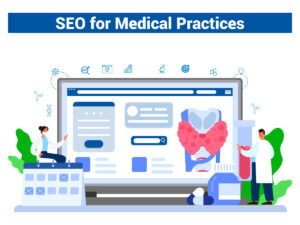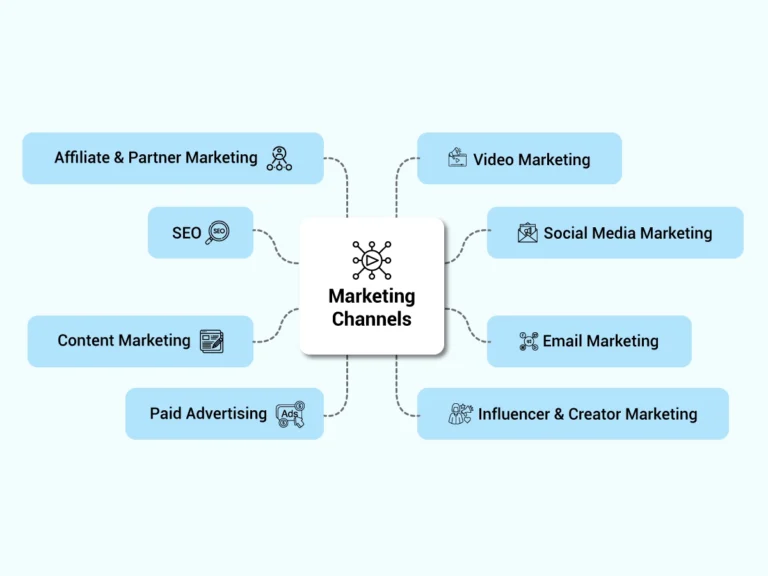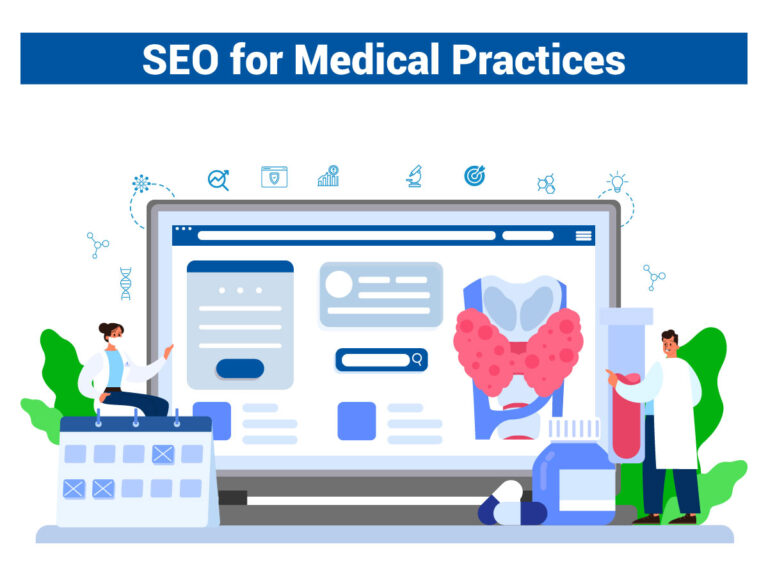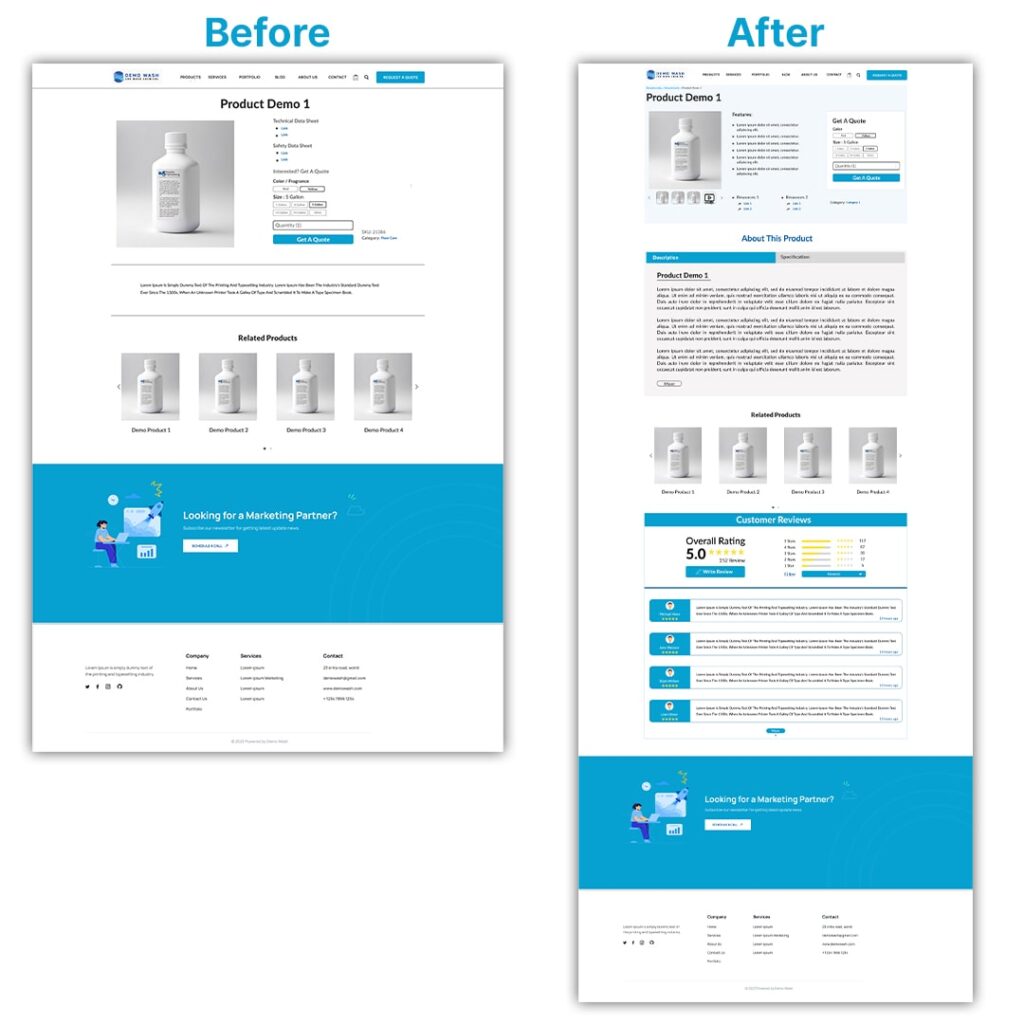If you are trying to improve its online presence, understanding PPC and SEO is crucial for any business. Pay-per-click (PPC) advertising involves paying for ad placement on search engine results pages. And Search Engine Optimization (SEO) focuses on improving organic search visibility. While PPC delivers instant traffic, it requires ongoing budget allocation, whereas SEO’s effects are more long-term. Both strategies aim to increase website visibility and drive traffic, but their approaches differ.
One key distinction between the two is audience targeting. PPC allows businesses to target specific demographics and behaviors with ads, whereas SEO relies on optimizing content to attract organic traffic from relevant searches. Another important aspect is cost-effectiveness. Although PPC provides immediate results, investing in SEO can lead to sustainable long-term growth without continuous advertising expenditures.
By understanding the nuances of each strategy, businesses can effectively utilize both PPC and SEO. That will maximize their online presence and achieve a balanced marketing approach.
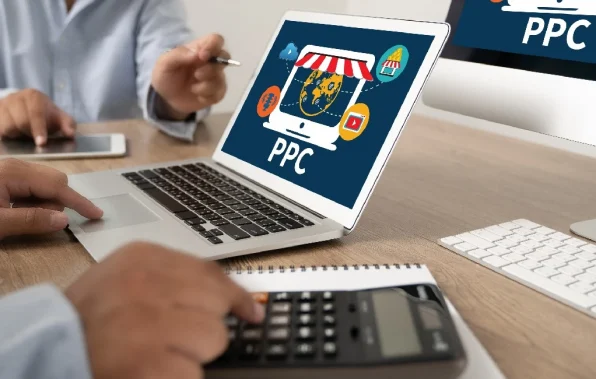
What is PPC?
PPC, or Pay-per-click, is a form of online advertising in which advertisers pay a fee each time their ad is clicked. It’s a way of buying visits to your site rather than attempting to earn those visits organically. One of the key benefits of PPC advertising is its ability to deliver quick results and drive targeted traffic to your website.
This makes it an effective tool for businesses looking to gain immediate visibility and generate leads. On its top, PPC allows for precise targeting, enabling advertisers to hone in on specific demographics, interests, and behaviors of their target audience.
Furthermore, PPC provides valuable insights into consumer behavior and preferences through analytics and performance data. By leveraging this information, businesses can optimize their campaigns for better results and ROI. When used in conjunction with SEO strategies, PPC can complement organic search efforts by filling gaps in keyword coverage and providing additional exposure for high-performing keywords.
What is SEO?
SEO, or Search Engine Optimization, is the process of optimizing a website to rank higher in search engine results pages organically. It involves creating high-quality content, improving website performance, and using relevant keywords to increase visibility and attract more organic traffic. SEO is crucial for businesses as it helps them connect with potential customers who are actively searching for their products or services online.
One of the key aspects of SEO is understanding user intent and providing valuable information that aligns with what users are looking for. By focusing on creating useful and relevant content, businesses can improve their search engine rankings and build trust with their audience. Also, SEO involves optimizing technical elements such as meta tags, site structure, and mobile-friendliness to ensure a seamless user experience. Overall, implementing effective SEO strategies can significantly boost a business’s online presence and drive sustainable long-term growth.
In today’s competitive digital landscape, SEO plays a vital role in helping businesses stand out among their competitors. By staying updated on search engine algorithms and trends, businesses can adapt their strategies to maintain high visibility and relevance in search results.
Furthermore, prioritizing local SEO tactics can help businesses target specific geographical areas and reach local customers effectively. Ultimately, investing in solid SEO practices not only improves a website’s ranking but also enhances the overall user experience while increasing brand credibility.
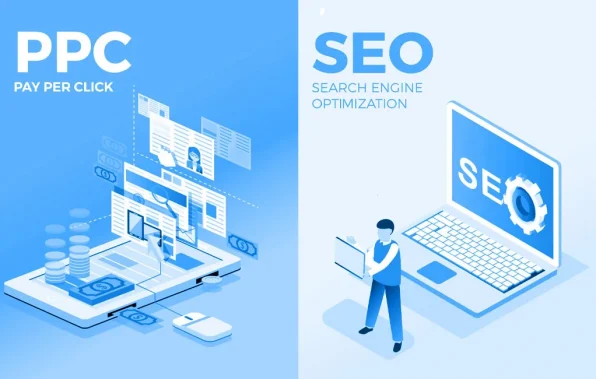
SEO and PPC: The Differences
By now you have developed and clear impression of what PPC and SEO are. When it comes to digital marketing, understanding the differences between SEO (Search Engine Optimization) and PPC (Pay-per-click) is crucial for creating an effective strategy.
One key difference lies in the timing of results – SEO is a long-term strategy. It requires ongoing investment and patience, as it takes time to build organic visibility. In contrast, PPC can generate immediate traffic and leads once ads are live. Another differentiating factor is cost. SEO demands continuous effort without upfront payment per click. But PPC requires a budget for every click received.
Let’s go in-depth, as understanding these distinctions can help businesses determine which approach aligns better with their goals and resources.
Cost and Budgeting Differences
When it comes to cost and budgeting, SEO and PPC couldn’t be more different. With SEO, the initial costs may be higher as you invest in optimizing your website for search engines and creating high-quality content. But over time, the costs decrease as organic traffic continues to flow in without ongoing ad spending. On the other hand, PPC requires a consistent budget for ad placement with immediate results but no long-term impact once the ads are turned off.
One key difference is that with PPC, you have direct control over the budget and can adjust it at any time based on performance. However, SEO costs may vary depending on the level of expertise required and could be seen as a long-term investment rather than an ongoing expense. Understanding these differences can help businesses make informed decisions about where to allocate their marketing budgets for maximum impact.
While both SEO and PPC are essential tools for driving traffic and generating leads, understanding their cost and budgeting differences is crucial for achieving optimal results. Balancing short-term gains with long-term sustainability is key when making decisions about where to invest marketing dollars.
Timeframe for Results
When it comes to SEO and PPC, one of the key differences lies in the timeframe for results. SEO is known for its longer time frame, often taking several months to see significant improvements in website rankings and organic traffic. This is because search engines require time to crawl and index new content, leading to a gradual increase in visibility.
On the other hand, PPC campaigns can yield immediate results, with ads appearing at the top of search results pages once activated. This difference in timing is crucial for businesses trying to determine which approach aligns best with their goals.
It’s important to recognize that while SEO may have a slower start, the long-term effects can provide sustained traffic and lead generation benefits. PPC, on the other hand, offers instant gratification but requires ongoing investment to maintain visibility.
By understanding the time frames associated with each strategy, businesses can make informed decisions about how to allocate their resources effectively. Ultimately, a combination of both approaches may offer an optimal balance between short-term gains and long-term sustainability.
Targeting Methods
One of the most effective targeting methods used in digital marketing is behavioral targeting. This approach focuses on analyzing user behaviors such as their browsing history, purchase patterns, and online activities to deliver highly relevant ads. By understanding the nuances of consumer behavior, marketers can tailor their messaging to resonate with specific audiences, increasing the likelihood of conversion.
Another powerful targeting method is geotargeting, which enables marketers to reach consumers based on their geographic location. This approach allows for personalized advertising based on regional preferences, local events, and cultural trends.
With geotargeting, businesses can create localized campaigns that speak directly to the target audience in a way that resonates with their unique surroundings. By leveraging the power of geography, brands can enhance their relevance and connect with potential customers in meaningful ways.
So, both SEO and PPC are valuable tools in digital marketing; they each offer distinct advantages and should not be seen as mutually exclusive. SEO provides long-term sustainability and credibility by improving organic search visibility and driving targeted traffic to a website. On the other hand, PPC offers immediate visibility, precise targeting options, and the ability to rapidly test new strategies. Moreover, a well-rounded digital marketing strategy often involves using both SEO and PPC in tandem to maximize online presence.

SEO and PPC: The Similarities
SEO and PPC may seem like two completely different digital marketing strategies, but they actually share some striking similarities. Both SEO and PPC aim to increase a website’s visibility on search engine results pages, ultimately driving traffic and conversions. While SEO focuses on optimizing content and website structure to improve organic search rankings, PPC relies on paid advertising to secure top ad placements.
However, both require careful keyword research, compelling ad copy or meta descriptions, and continuous monitoring and optimization. Moreover, both SEO and PPC involve analyzing data to track performance and make informed decisions for strategy refinement.
Targeting Keywords and Audience
Targeting Keywords and Audience is the cornerstone of any successful SEO or PPC strategy. To effectively reach your audience, it’s crucial to understand their search intent and behavior. Start by conducting thorough keyword research to identify relevant terms that align with your business offerings and resonate with your target audience. By targeting specific keywords, you can optimize your content to rank higher in search engine results pages (SERPs) and attract qualified leads.
Moreover, understanding your audience’s demographics, preferences, and pain points is essential for crafting compelling ad copy and content that resonates with them. Tailoring your messaging to address the specific needs of your audience can significantly improve engagement and conversion rates.
Utilize tools like Google Analytics to gain insights into user behavior. Thus, you can leverage this data to refine your targeting strategies for both organic search and paid advertising campaigns. By combining keyword targeting with a deep understanding of your audience, you can create a powerful interaction that drives meaningful results in both SEO and PPC efforts.
Importance of Quality Content
In the world of digital marketing, quality content serves as the backbone of successful SEO and PPC strategies. Not only does it improve search engine rankings, but it also drives significant engagement with target audiences. Well-crafted content that addresses the needs and interests of users can significantly impact click-through rates, conversion rates, and ad performance.
Whether it’s an informative blog post or a compelling ad copy, quality content has the power to capture attention, build trust, and ultimately drive desired actions.
Moreover, high-quality content contributes to a positive user experience by providing valuable information and solving problems for consumers. Search engines are increasingly prioritizing user-centric content in their rankings. So, creating relevant and engaging materials has become essential for both organic visibility and paid advertising success.
As such, investing in quality content not only enhances brand credibility but also lays a solid foundation for effective digital marketing campaigns. So, you better align SEO and PPC efforts around compelling and useful content. As a result, your businesses can create a cohesive strategy that maximizes visibility while delivering genuine value to their audiences.
Tracking and Analysis
Tracking and analysis are crucial aspects of both SEO and PPC campaigns. In SEO, tracking involves monitoring various metrics such as keyword rankings, organic traffic, bounce rates, and click-through rates. Analyzing these data points enables marketers to identify trends, understand user behavior, and make informed decisions to optimize their strategies.
Similarly, in PPC advertising, tracking involves measuring ad performance metrics like click-through rates, conversion rates, cost per click, and return on ad spend. By analyzing these data points, marketers can assess the effectiveness of their ad campaigns and make necessary adjustments to improve results.
One interesting similarity between tracking in SEO and PPC is the need for continuous monitoring and adjustment. Both require ongoing analysis to stay relevant in a dynamic digital landscape.
Furthermore, both disciplines benefit from a data-driven approach that empowers marketers to pivot their strategies based on real-time insights. This emphasizes the importance of leveraging tools like Google Analytics for SEO tracking and platforms like Google Ads for PPC campaign analysis. Overall, effective tracking and analysis play integral roles in driving success for both SEO and PPC initiatives.
Budgeting and Cost Efficiency
Budgeting and cost efficiency are crucial aspects of both SEO and PPC efforts. In SEO, it’s essential to carefully allocate resources to various strategies such as content creation, link building, and technical optimization. By proper budgeting, businesses can prioritize the most impactful tactics that align with their goals and target audience.
In PPC campaigns, too, cost efficiency is paramount, as every click or impression comes at a price. Understanding the value of each advertising dollar spent allows for more strategic bidding strategies and ad placements. Ultimately, you will gain a maximized return on investment.
Moreover, implementing a data-driven approach to budgeting can significantly improve cost efficiency in both SEO and PPC. You should constantly analyze performance metrics and adjust budgets based on real-time data. Thus, businesses can identify underperforming areas and allocate resources where they would have the most impact. It’s not just about spending less but spending smarter. Identifying opportunities for optimization through a thorough analysis of customer behavior patterns and campaign results leads to more efficient use of marketing resources.
Yes, SEO and PPC may have their distinct differences. However, they share common goals of driving online visibility and increasing traffic to websites. Both strategies are essential components of a comprehensive digital marketing approach and can complement each other when used in tandem.
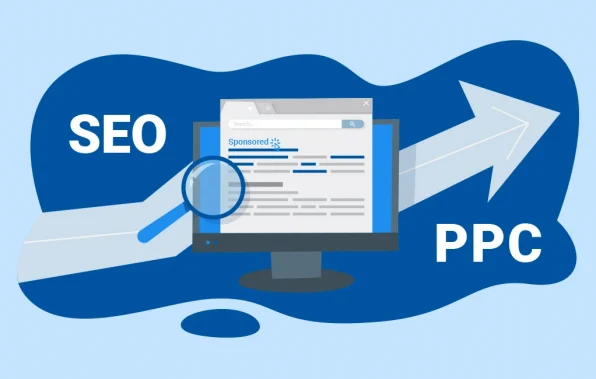
Does PPC Affect SEO, or Does SEO Affect PPC?
There has been a longstanding debate about the relationship between PPC and SEO – does one affect the other, or do they operate independently? The truth is that both PPC and SEO can have a significant impact on each other. While PPC doesn’t directly influence organic search rankings, well-optimized ads can actually lead to higher click-through rates and more traffic to your site. For sure, that, in turn, can positively impact your SEO efforts.
On the flip side, strong organic search visibility through effective SEO strategies can lead to increased brand recognition and trust. Beyond any doubt, that can improve the performance of your PPC campaigns.
Furthermore, integrating PPC and SEO strategies can yield even greater results. For example, you can keyword data from successful PPC campaigns to inform your SEO strategy. That will help you focus on high-performing keywords in organic search while enhancing ad relevance in paid search.
This symbiotic relationship ultimately leads to better overall visibility, increased website traffic, and improved conversion rates. You must recognize and appreciate the interconnectedness of these two digital marketing tactics. Then, you can leverage their strengths together to see businesses maximize their online presence and drive more successful outcomes.
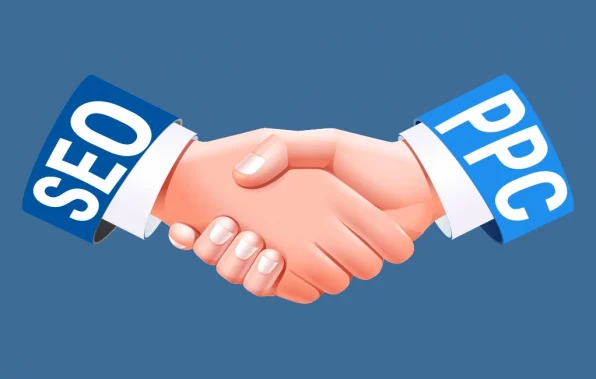
How SEO and PPC Can Work Together to Improve Your Website?
When it comes to improving your website’s online presence, integrating SEO and PPC strategies can yield powerful results. While SEO focuses on organic traffic and long-term visibility, PPC enables you to quickly reach a targeted audience through paid ads. By combining these two approaches, you can create a synergy that maximizes the impact of your digital marketing efforts.
One way they can work together is by using PPC data to refine your SEO strategy. Analyzing the keywords that perform well in PPC campaigns can inform your SEO keyword targeting, helping you optimize your website for the most relevant terms. Additionally, you can utilize PPC ads for high-competition keywords while simultaneously working on ranking organically for those same keywords. That can help occupy more real estate on search engine results pages (SERPs), increasing visibility and driving more traffic to your site.
By leveraging both channels effectively, businesses can achieve a comprehensive online marketing strategy that not only increases website traffic but also enhances overall brand awareness and conversion rates. Intelligently coordinating SEO and PPC efforts allows for a holistic approach towards dominating the search engine results page and reaching potential customers at different stages of their buyer’s journey.
Integrated Marketing Strategies Augment Business Growth
The power of integrating marketing strategies lies in its ability to create a cohesive and comprehensive approach that leverages the strengths of different channels. When PPC and SEO work together, they amplify each other’s impact by targeting the same keywords and audience from multiple angles.
This integrated approach not only increases brand visibility but also enhances credibility and trust among consumers. By combining paid advertising with organic search efforts, businesses can establish a stronger online presence while maximizing their reach and ROI.
Furthermore, co-ordinated marketing approaches allow for better data sharing and analysis, leading to more informed decision-making. The interaction between PPC and SEO enables marketers to gain valuable insights into customer behavior, preferences, and trends across various touch points. This holistic view empowers businesses to refine their messaging, optimize their campaigns, and ultimately drive higher conversions.

FAQs
Yes, SEO and PPC can and should be used together for a balanced digital marketing strategy. They complement each other and can work together to achieve your business goals.
While both SEO and PPC involve costs, SEO is generally considered to be more cost-effective in the long run. PPC involves ongoing costs per click, while SEO involves upfront costs for optimization but can lead to sustained organic traffic.
Both SEO and PPC have their challenges. SEO requires a deep understanding of search engine algorithms and a commitment to updating your site to keep up with these changes. PPC requires strategic keyword bidding, ad creation, and continuous monitoring to ensure your ads are effective.
PPC might seem cheaper in the short term as you only pay per click, but these costs can add up over time. SEO, on the other hand, involves an initial investment for optimizing your site but can lead to sustained organic traffic without the need for ongoing costs per click.
No, PPC is not only Google Ads. PPC stands for Pay-Per-Click, which is a model of online advertising where advertisers pay a fee each time their ad is clicked. Google Ads is Google’s own PPC advertising platform, but there are also other platforms like Bing Ads, Facebook Ads, and Amazon Advertising that operate on the same principle.

